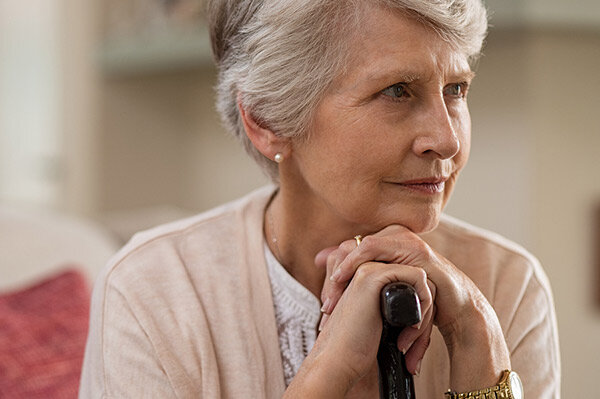10 Tips for Reducing Elderly Anxiety
10 Tips for Reducing Elderly Anxiety
Anxiety disorders are the most common mental illness in the United States. Even though the numbers are hard to determine, it is estimated that between three to fourteen percent of the elderly experience anxiety disorders. Researchers first thought that the rate of anxiety increased with age, but new studies are showing that those who have anxiety as a senior citizen probably had anxiety as a younger adult as well. Sometimes older adults have anxiety based on stressful situations. Perhaps your loved one has lost a friend or relative. Maybe he or she feels anxiety over decreasing health or increasing isolation. Maybe your loved one is concerned about money. Perhaps your loved one suffers symptoms of anxiety because he or she is thinking about past mistakes or missed opportunities.Regardless of the reasons, anxiety can manifest itself in a number of physical symptoms. Some signs of anxiety in older adults can be an increased heart rate, back pain, or headaches. Since these physical symptoms can be the result of other bodily conditions, it can be challenging to diagnose anxiety in older adults.While we know that anxiety is normal for an adult, how do we handle it when the senior we care for is suffering from the effects from it? How can we help our loved one reduce anxiety? While the best thing to do is to discuss the anxiety symptoms with a doctor, here are ten steps caregivers can try to help reduce anxiety in their loved ones.
Sometimes older adults have anxiety based on stressful situations. Perhaps your loved one has lost a friend or relative. Maybe he or she feels anxiety over decreasing health or increasing isolation. Maybe your loved one is concerned about money. Perhaps your loved one suffers symptoms of anxiety because he or she is thinking about past mistakes or missed opportunities.Regardless of the reasons, anxiety can manifest itself in a number of physical symptoms. Some signs of anxiety in older adults can be an increased heart rate, back pain, or headaches. Since these physical symptoms can be the result of other bodily conditions, it can be challenging to diagnose anxiety in older adults.While we know that anxiety is normal for an adult, how do we handle it when the senior we care for is suffering from the effects from it? How can we help our loved one reduce anxiety? While the best thing to do is to discuss the anxiety symptoms with a doctor, here are ten steps caregivers can try to help reduce anxiety in their loved ones.
1. Take your loved one to get a routine check-up
Rule out any physical symptoms that may be causing anxiety. Some physical diseases can cause symptoms of anxiety. Parkinson’s disease can affect a patient’s mood. Anxiety is common through all stages of dementia and Alzheimer’s. Low or high blood sugar may cause a person to feel anxious. Having a complete checkup to rule out dreaded diseases such as cancer and heart disease may put your loved one’s mind at ease.
2. Monitor your loved one’s diet
The food you eat can directly affect your emotions and how you handle stress. Make sure your loved one has a balanced diet. If the senior citizen in question experiences drastic swings in blood sugar levels, this can cause his or her anxiety to increase. We all should avoid processed foods and simple carbohydrates.Instead, a diet of superfoods such as salmon, greens, nuts, berries, and healthy fats may reduce anxiety. Seniors who suffer from anxiety should avoid caffeine and alcohol. As we age, we also lose our ability to feel thirst. Make sure your loved one is properly hydrated.
3. Encourage your loved one to exercise
Exercise has been proven to improve most people’s moods, relieve tension, and allow people to have a more positive outlook on life. Start small. Have your loved one go for a short stroll, even if it is inside the house. Turn on some music and encourage your loved one to dance in the kitchen. If the senior citizen is not mobile, have him or her perform exercises from a seated position.
4. Ask your loved one if he or she would like to talk with a member of the clergy
Perhaps your loved one will feel less anxiety after receiving counsel from a trusted member of the clergy. Even if your loved one was not a particularly spiritual person in his or her earlier life, visiting a minister or rabbi may help your loved one work through painful memories or thoughts he or she may be having as a result of aging.Keep your own biases and judgments to yourself regarding your loved one’s spiritual choices. Allow your family member privacy as he or she speaks with the spiritual leader.
5. Ask your loved one if he or she would like to talk with a therapist or counselor
While many people from the older generation did not often seek advice from therapists, perhaps your loved one will be open-minded enough to understand the benefits of having some therapy sessions. Set up a time for your family member to speak with a mental health professional privately.
6. Suggest ways your parent can volunteer their time or talents
A common practice to reduce anxiety is to volunteer for organizations that help others less fortunate than you. This is also true for the elderly. Organize these volunteer opportunities for your loved one.A person suffering from anxiety can probably come up with a whole list of reasons why it is not a good idea for them to volunteer. That’s why you need to set up the experience. Perhaps your senior citizen enjoys crocheting. Seek out organizations that create hats or blankets for cancer patients or infants. Maybe your loved one is able to garden. Find a community garden that he or she can volunteer at several days a week.
7. Try to determine if your loved one is seeking attention by fixating on his or her worries
Perhaps your loved one wants to spend more time with you. Maybe he or she feels lonely and wants more attention from you. Spend the time you have together focusing on good memories. Reassure your loved one that you appreciate them and need them. Set regular appointments with your loved one, so he or she knows that you will be returning soon. Keep those appointments.
8. Help your loved one de-clutter their surroundings
Perhaps your loved one suffers symptoms of anxiety because he or she is living with a mess. The older adult may not be able to articulate that the confusion is the reason, but it could be subconsciously affecting how he or she feels. Help your loved ones organize their belongings. This is also an excellent time to make sure the areas where your loved one spends most of the time is free from tripping hazards.
9. Set up social interactions for your aging parent
Perhaps your loved one has too much time in his own thoughts. Possibly having a variety of visitors would help combat the anxiety your loved one feels. Set updates with friends and neighbors your loved one enjoyed in the past. If having visitors to his or her own home is stressful for your family member, consider hosting the visit at your home or a neutral location. Give your parent privacy during these visits.
10. Analyze your emotional health
If you are the primary caregiver, perhaps your own anxiety is rubbing off on your loved one. Are you particularly high strung? Are you a worrier? Do you share your thoughts and worries with your aging family member? Do you seem distracted during your visits? Are you always looking at the clock, or do you seem not in the present when you visit? Perhaps you or another family member may be worsening your family member’s mental health.The most important technique to reduce anxiety is to communicate. Consider asking your mother or father why he or she is worrying. Talk through the difficulties. Gently offer suggestions.Keep your voice and manner calm during these discussions. Help your loved one keep all their troubles in perspective. Reassure your aging family member to take one day at a time. Chances are, you will be giving your parent the same advice that he or she gave you earlier in your own life. 
